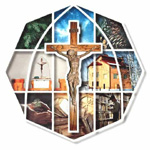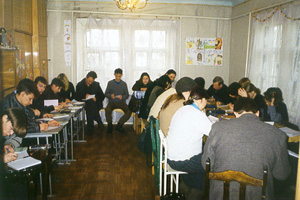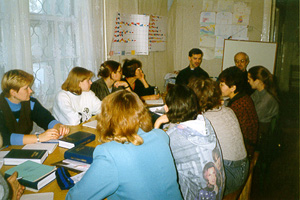 |
Pre-seminary education: Biblical school in Khakasia.Origin of the school and its purposes The biblical school in Khakasia is a division of the primary theological education provided by Lutheran Theological Seminary in Novosibirsk. This school, located in the city of Touim, originated with the intent to educate in Lutheran theology those people who were already doing some work in the church. It is obvious that not all church work requires a full seminary education. Besides, the situation in Khakasia is very dynamic, as the congregation there is still a missionary congregation in certain ways. It is not always possible in this situation to wait for a person to go through a lengthy program. The biblical school was also organized as an institute of pre-seminary training that would enable its male graduates to enter LTS and study there, should they be willing to pursue the formal road of higher theological education leading toward ordination and ministry in the church.
Academic program The program of education in the biblical school lasts for two years. The method is a combination of distance education and on-site training. Each month the students are taught a course by an instructor and are given assignments. Following the actual course, they do their work and research using the textbooks designated for the course. As our goal is to keep the course of study at a relatively high level, we ask teachers not to condescend to the students in their requirements for the course work. We are also ready to discontinue the education of those students who fail to cope with their studies (although we have not had to do this yet). The academic program of the biblical school in Khakasia consists of the following subjects (the first four courses have already been offered in the 1999-2000 academic year):
Practical work of students We think that this program is helpful for those who lead Sunday school classes as well as for those involved in the practical service or in social aid. Even now the majority of students has some constant work in the church. Mostly this is missionary work (visiting people in Tuim, Vlasievo, or Kirovo, and leading matins and vespers when the ordained minister is not present), children’s work in these congregations, social aid (distribution of humanitarian aid, organization of free meals for the hungry). Some students also work for the church newspaper “New Touim.” Staff The school in Khakasia has one staff worker: Fr. Pavel Khramov, deacon of the Lutheran parish in Novosibirsk. His responsibilities include dealing with practical matters (providing textbooks, organization of professors’ visits in Touim, writing reports). Also he coordinates the academic process: scheduling sessions and topics, checking student assignments when necessary, and also giving lectures if another professor is unavailable for a particular course.
Benefits of the school location in Touim There are several reasons why Touim is the most convenient place now to hold such activities:
Students from outside Khakasia Although the original purpose of the school had the needs of congregations in Khakasia in view, the importance of such education was realized in other places as well. The high level of education, the practical character of the courses that were offered, and the confessional stand of the school attracted students from other regions. At the moment we have one student from Novosibirsk (from the congregation of Pastor Jeff Thormondson), five students from Buryatia, and one student from Chita (Transbaikal region) studying at the biblical school in Khakasia. Along with this, we constantly get requests to admit new students, to enroll a new group, or to organize yet another school in which more students from Eastern Siberia can study. (At present, long distances and the resulting high cost of travel do not allow us to receive all those who are willing to study and are capable of doing it.) Student body At this time the biblical school in Khasia is training 22 people, 11 men and 11 women. Out of this number, one student is from Novosibirsk, one is from Chita, four are from Petropavlovka, Buryatia (three men and one woman), one is from Ulan Ude (the administrative center of Buryatia), three are from Vlasievo, and the rest are from Touim itself. Judging by potential and academic records, at least four of the male students have a good chance of entering LTS once they have completed the program in Khakasia. Plans for the future In many ways the future will be determined by developments that are occurring now. Originally the program was planned for two years. No recruitment was in view for the current year, the year 2000. Therefore there are no funds for this, although the school seems to be a very productive thing. Help therefore is needed. As it was stated before, it seems useful and promising to broaden the activity of the biblical school. There are at least three reasons that make us think this way:
Unfortunately, such development of the school’s activity is facing financial difficulties. There is a need for additional resources to cover travel expenses as well as room and board for students from regions outside Khakasia. Also, we are experiencing a lack of qualified instructors. Possibly the latter problem can be resolved by calling upon the skills of our church members who have received a seminary education at Concordia Theological Seminary in Fort Wayne. Widening the scope Finally, it would be worth mentioning that the establishment of a biblical school in Khakasia has become a real testimony to Touim parishioners that they are not neglected. This congregation has gone through some severe trials from the local administration in recent years. And so the school has become a strong reminder of God’s faithfulness toward his people. Also, the people in Khakasia can now see the universal nature of Christianity as teachers from America come to teach them and students from other cities come to study. They see not only that the church can be found in many places, but also that the mission is universal in scope. Now people in Khakasia can see that the school prepares church workers not only for Touim or even for all Khakasia, but for the whole of Eastern Siberia. |


